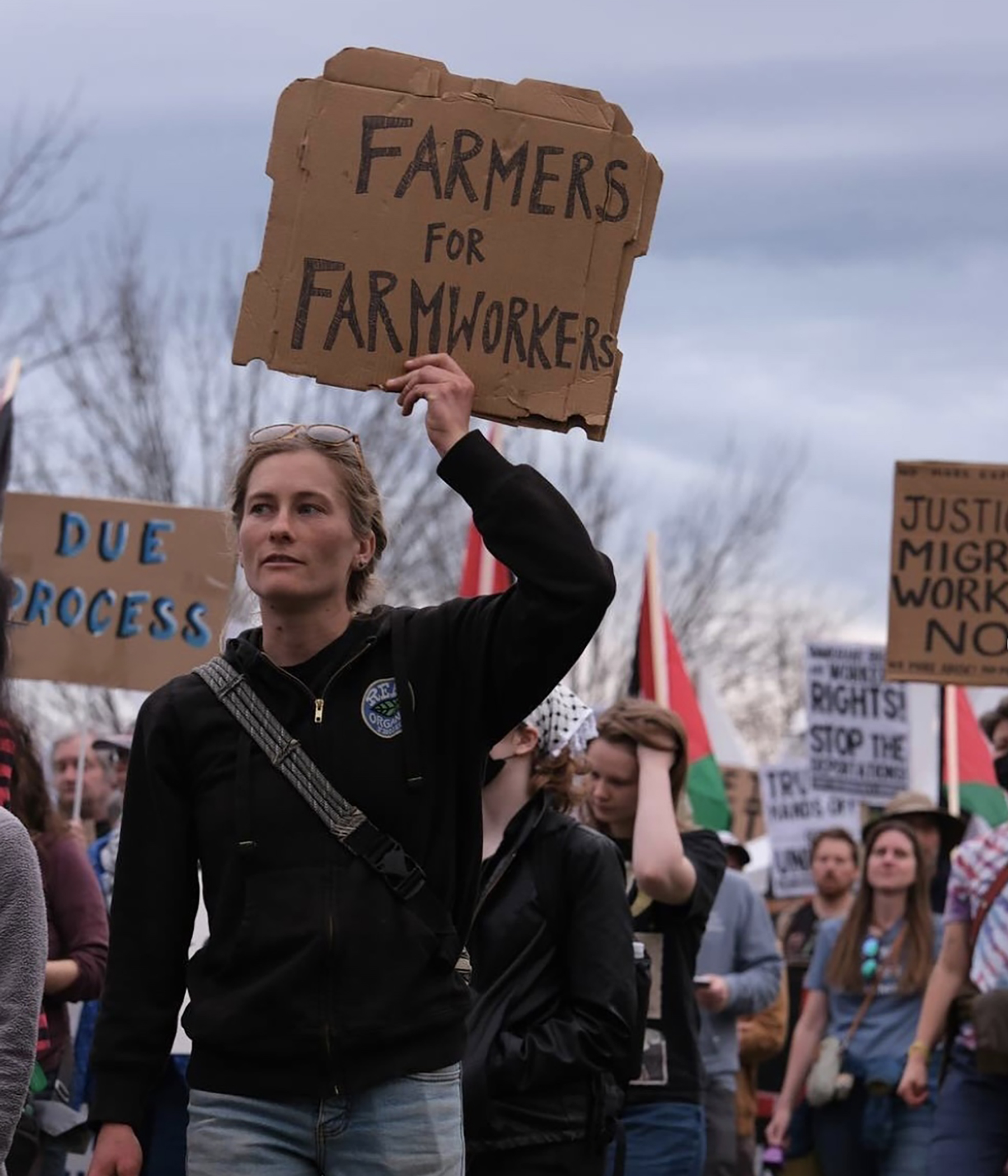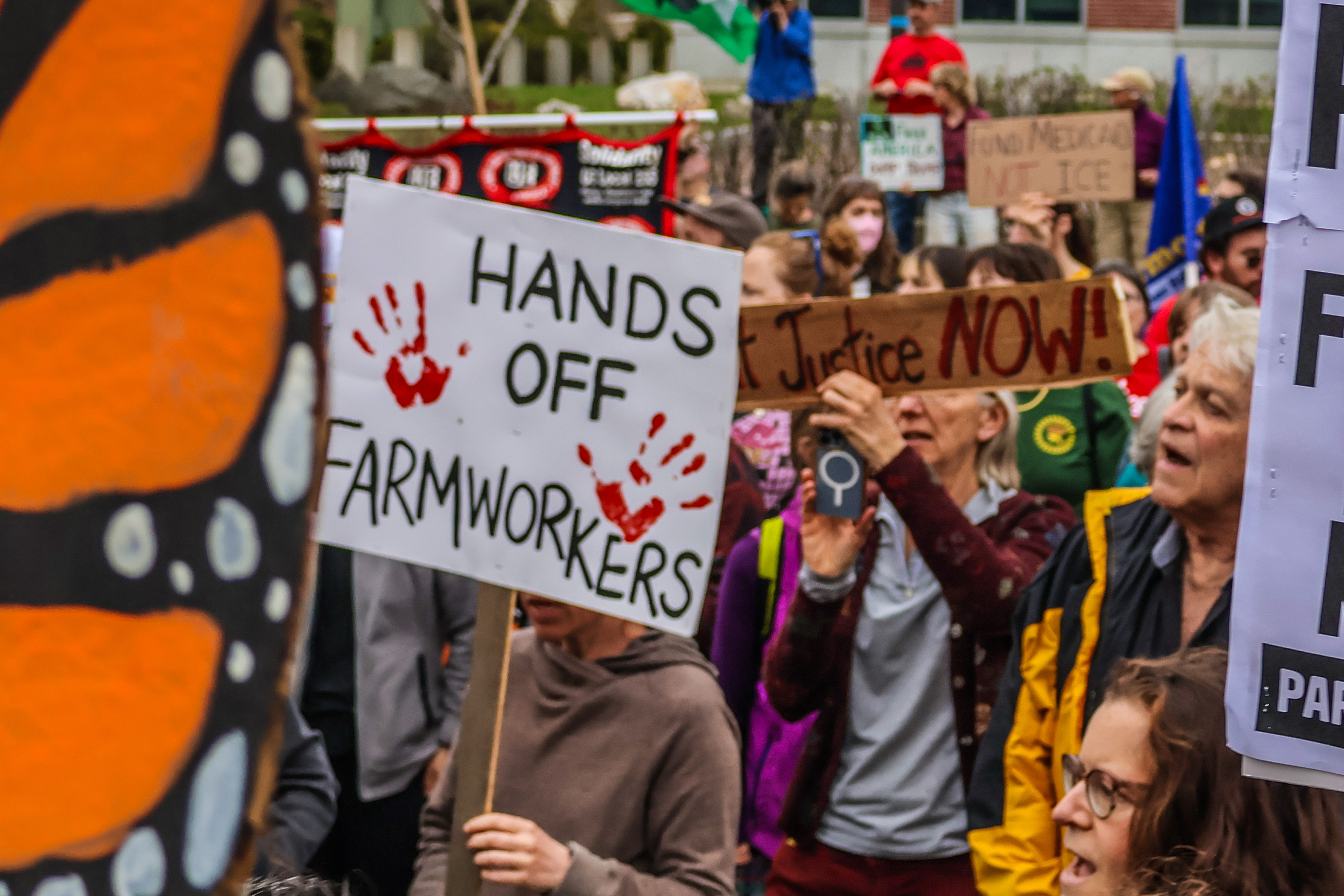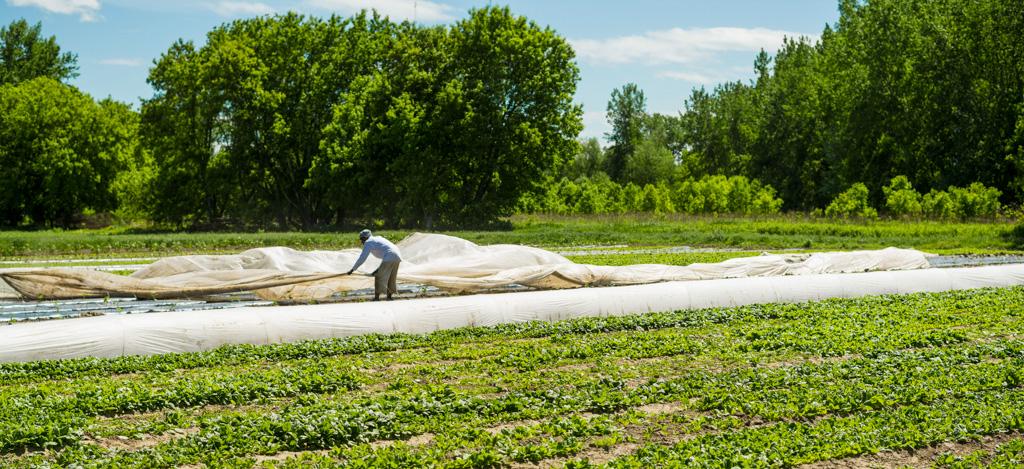October 2, 2025
While attending a May Day Migrant Justice picket and march at Hannaford Supermarket in Williston, NOFA-VT staffers recognized farmer Mollie Griffin of Glinnis Hill Farm carrying a “Farmers for Farmworkers” sign. Curious to learn more about what brought her to the action, we asked Mollie to share her reflections and later sat down with her on a sunny afternoon in August to discuss more. What follows is what Mollie shared in writing, followed by excerpts from our conversation.
I wholeheartedly believe that small farms are critical in so many ways, for the health of people, land, communities, and local economies. But working on—and later owning—a small farm has made me realize just how small our operations are. While our fifty CSA shares and farmers market sales are important, they are a drop in the bucket when it comes to feeding our country. Even with thriving small farms, our food system remains reliant on large-scale farms and the migrant farmworkers who keep them running.
Owning my farm has also given me perspective on labor. I work hard, but I know I have it easier than the workforce that powers most farms across the country. I have come to appreciate that I can’t even imagine how hard it must be to work 12+ hour shifts, 7 days a week, for someone who may not even treat you with dignity.
So last winter, when I felt overwhelmed by the news, I decided that the antidote to “flooding the zone” is to choose a few causes I believe in and commit to fighting for them. For me, that meant standing in solidarity with migrant farmworkers and working for food access. I began getting involved where I could with Migrant Justice, and feel really inspired by the tangible work they are doing. My husband and I take turns picking up extra work on the farm so the other can attend a rally. Even on the days when I stay behind so that he can go, I feel like I’m showing up in a small way to support the causes I care about.

The day this picture was taken, I had gone to Williston to support the Migrant Justice picket line for Milk with Dignity, not knowing that it was part of a bigger protest. I was pleasantly surprised to find such a big crowd and inspired by the energy and assortment of causes each person was there to represent. As we continue moving through the season, I feel energized by opportunities to take part in the movement for farmworker rights, whether by participating in the smallest of ways or shuffling our harvest schedule to accommodate our attendance at a rally.”
Jessica: Have you done more with Migrant Justice since the May Day picket and march?
Yes, we’ve been attending immigration hearings at ICE offices. It feels powerful to show up in support of someone who needs it. One of the things we value is being able to decide together what matters to us—and, because we work for ourselves and don’t employ anyone else, we can shift our schedules to be in St. Albans at 10 a.m. in the middle of the week. We know not everyone has that flexibility, which is why we make it a priority.

Jessica: Can you say more about why it’s important for you to prioritize farmworker justice?
For me, it really comes down to empathy. As a farmer, I understand how much labor goes into this work, and it makes it easier to relate to farmworkers. I can’t imagine doing that same labor under the difficult conditions many migrant workers face. I’m always struck with admiration when I see videos of workers on large-scale farms—their skill and endurance are incredible.
Jessica: You also prioritize food access and have a sliding scale CSA. Can you tell us about that?
We offer a sliding scale CSA because we didn’t want to create a business that only wealthier people could access. Right now, some of our CSA members are at risk of losing SNAP, and one has already lost benefits this year because she doesn’t have a green card. It was intense to realize how much more limited her options are for feeding her family, but we know they’ll still have our vegetables. We’ve also started experimenting with growing more calorie-dense foods, like beans and grains, to better support food access. I’m glad we can offer what we do, though I recognize that our veggies and beans are still a long way from replacing SNAP.
Jessica: Do you ever run into other farmers or customers at the Migrant Justice events you’re able to participate in?
Yes, we often see our customers at Migrant Justice events, which is always wonderful. Sometimes people will stop by our booth at the market and say, "Hey, didn’t I see you at the Migrant Justice rally?" It’s great to make those connections in different spaces.
We appreciate NOFA-VT Members Mollie and Gus of Glinnis Hill Farm for all the goodness they bring to farming and their community, and for showing up as farmers for farmworkers. Migrant Justice is continuing to organize support for farmworkers and Vermont’s immigrant communities. If you’d like to learn more or get involved with Migrant Justice, sign up for their email list, and learn more about upcoming events, trainings, and ways you can help.

